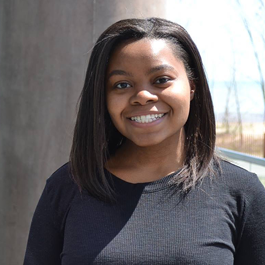
Civil Engineer
Greeley and Hansen
Solving for Water Scarcity
Jordan Fleming envisions a future where municipalities of all sizes and demographics have resilience to water scarcity, a pressing issue she first learned about as an undergraduate student at Northwestern and now addresses as a civil engineer.
Fleming is an alum of the McCormick School of Engineering where she majored in mechanical engineering with a minor in environmental engineering. In the classroom, she was impacted by lessons learned in the required Design, Thinking, and Communication (DTC) class. The course incorporates the use of communication in the context of design, giving students opportunities to work with real-life clients in creating real design solutions. “You take the project from beginning to end. I feel like that really helped me to frame the rest of my engineering studies,” says Fleming. She also fondly recalls the impact of Sustainable Water Systems, a class taught by George Wells, associate professor of civil and environmental engineering, which viewed water from a social, financial, and economic perspective rather than only through a technical lens and helped cement her interest in water as a career.
Outside of class, Fleming worked in Professor Wells’s lab as a research assistant where she began to explore the energy and water nexus. Fleming was also involved with the Center for Water Research at Northwestern, and she enjoyed the time spent learning from Center Director Aaron Packman, professor of civil and environmental engineering, chemical and biological engineering, and mechanical engineering, who helped to set her on the path to her career.
Fleming went on to earn a master’s degree in civil engineering at the University of Illinois at Urbana-Champaign through the interdisciplinary Energy-Water-Environment Sustainability (EWES) program. As a graduate student, she conducted a multitude of projects from researching the primary policy systems governing water law in the US, designing water treatment systems powered by solar energy, to increasing the depth of her knowledge of water issues.
“We’re coming to see that this is unsustainable. We’re drawing from those water sources at a rate much quicker than they’re being naturally replenished. We are really going to have to do things differently.”—Jordan Fleming (McC '17), Civil Engineer at Greeley and Hansen
Much of Fleming’s work involves finding solutions to provide equitable water access for everyone. An important part of finding solutions to social water issues relies on being cognizant of different people’s needs, which is something that she especially enjoys doing.
Today, Fleming is a civil engineer at Greeley and Hansen, an environmental engineering firm that specializes in water and wastewater engineering as well as utility management consulting, where she works on unique engineering solutions in the water sector.
Her most rewarding projects have included work for the City of Waukesha, Wisconsin, a large conveyance project for a community to change their water source to a more sustainable and resilient source water – Lake Michigan. This project also involved a modification of the Great Lakes Compact, a formal agreement among Great Lake States that aims to manage and protect water as a valuable resource in the Great Lakes – St. Lawrence River Basin. Separately, she has addressed water scarcity issues for some of the largest communities in Illinois with the City of Chicago. There, she worked to develop engineering solutions for water scarcity and related issues. “We really needed a solution because not having one would be catastrophic... I’m most proud of being able to give input on the ground floor and bring up ideas for discussion.”
Fleming is keenly aware that water as we know it is changing, and that uneven water access is uneven across the country. For example, “there are so many communities that are on deep aquifers that have been using them for such a long time,” Fleming says. “We’re coming to see that this is unsustainable. We’re drawing from those water sources at a rate much quicker than they’re being naturally replenished. We are really going to have to do things differently.”
For aspiring engineers and anyone interested in the energy and water sector, Fleming advises exploring outside the boundaries of classes by talking to professors to gain greater insight on the industry, being involved in student groups, and trying different internships. From her own experience, Fleming believes that internships and opportunities outside of class helped her to better identify her passions.
In trying to take novel approaches to such pressing water issues, Fleming looks forward to a collaborative future where people can work together to pool resources to address the challenges of water scarcity.